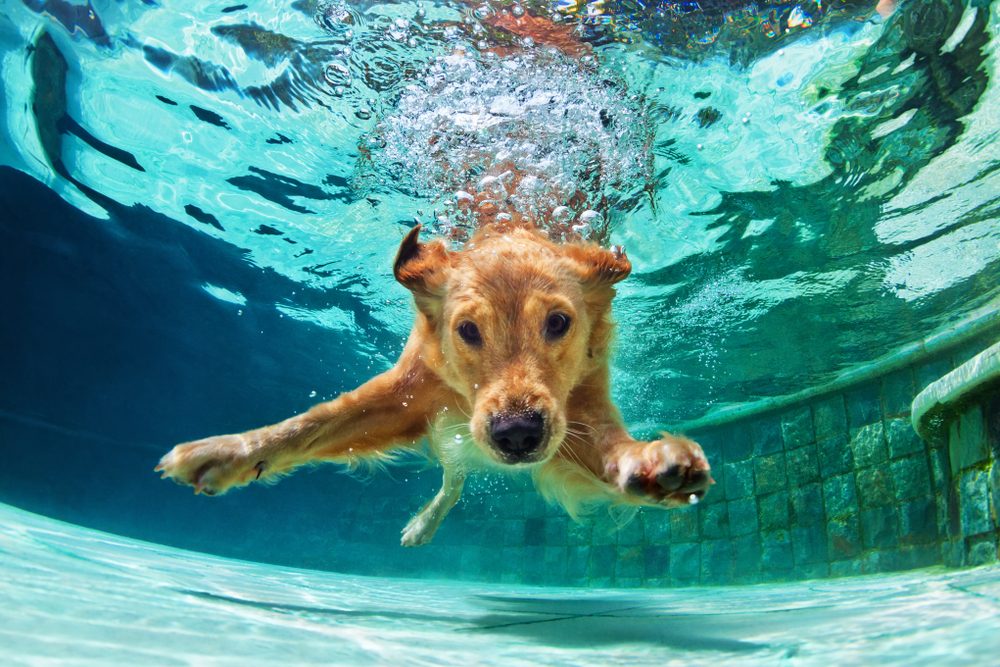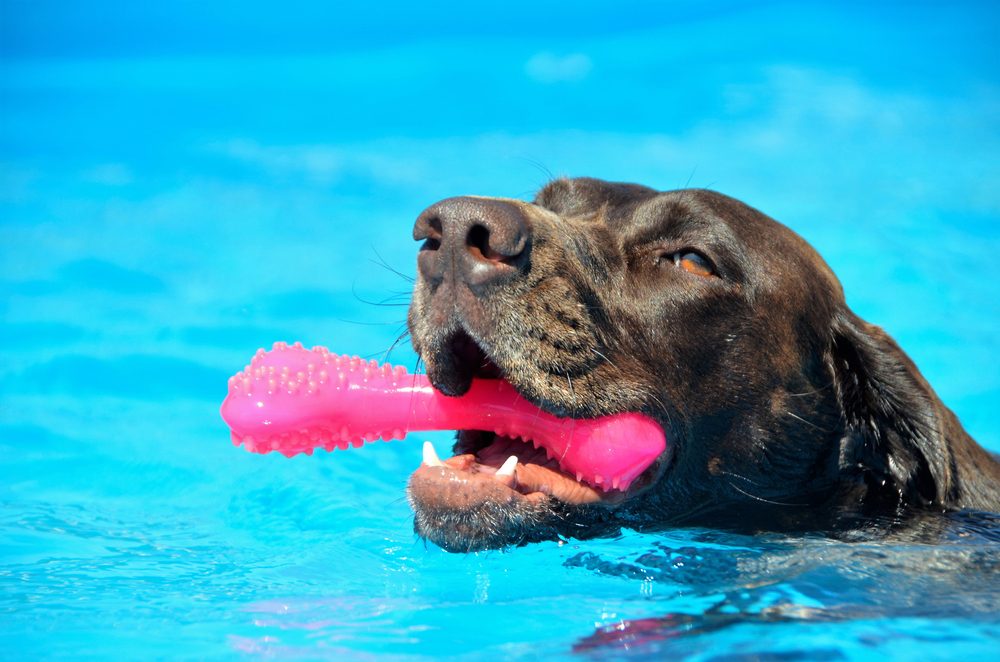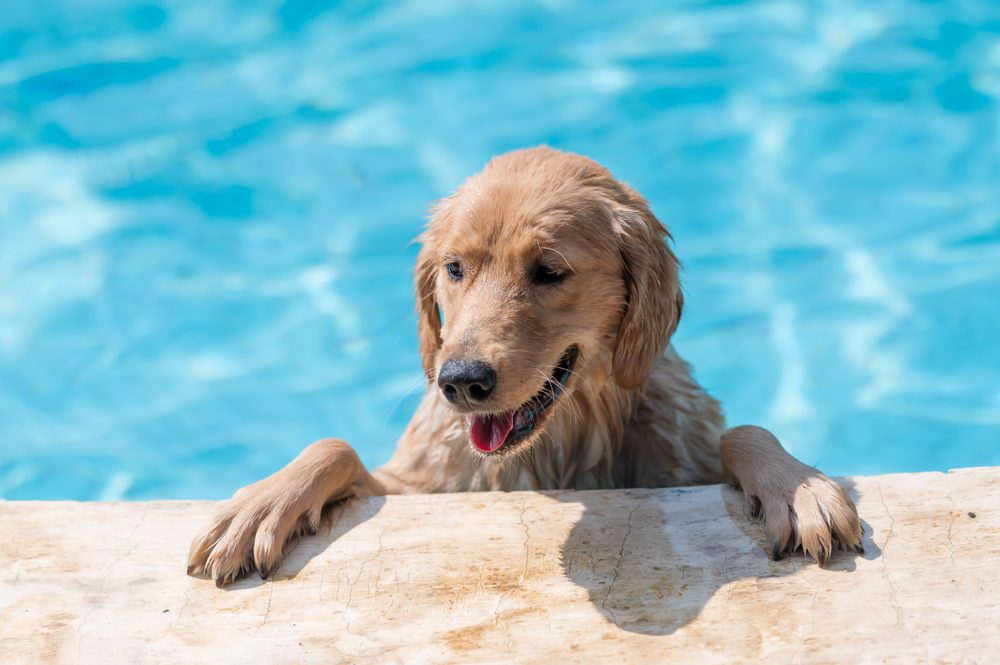The weather is finally warming up, and we all know what that means. No more bundling up under numerous layers of bulky, itchy wool. No more going to work and coming home in complete darkness. As we welcome the oncoming warmth, it’s time to start planning summer activities in advance. Whether you live near the ocean, a lake, or you have your own pool, all pet parents know that swimming with dogs is one of the most enjoyable ways to spend a lazy summer afternoon.
But safety should always come first. Here’s everything you need to know about swimming with your dog the safe way.

Does my dog need a life jacket?
The answer to that question is a complex one. Some breeds, such as pugs, bulldogs, Frenchies, and boxers, have flat faces and barrel-shaped chests, making them susceptible to breathing difficulties in hot weather. They’re also top-heavy because of their builds, so they may not be able to swim well without the additional support of a life jacket. Thinner dogs, like greyhounds and whippets, may sink like a stone because they have very little body fat. Similarly, dogs with very short legs, like dachshunds, may have difficulty treading water and sink to the bottom of the pool.
If you’re taking your pup to a lake or the ocean, you should always outfit them with a life jacket. Even strong swimmers can tire out, especially young puppies, dogs with health problems, and senior dogs. If your dog doesn’t tolerate wearing a life jacket, we recommend sticking to your pool and staying close to your pup at all times. You should never leave your dog unattended in the water. So, if you’re still wondering if your dog needs a life jacket, our final answer is, “Probably. It’s better to be safe than sorry.”
How far can my dog swim?
Not only is swimming enjoyable, but it’s also a fantastic, low-impact workout for older pups with arthritis since the water supports their weight and relieves joint pressure and inflammation. But a senior dog won’t be able to swim as far as a younger, healthier dog. Young puppies still have tiny legs, and they get tired easily. Certain dog breeds, like golden retrievers and Portuguese water dogs, are natural-born swimmers who may be able to swim for miles.
However, your teacup chihuahua probably won’t be able to swim very far at all. Depending on your dog’s breed, the average, healthy dog can typically swim for approximately 100 yards for small and medium-sized (or up to three to four miles for larger breeds) before he becomes too tired to keep going.

How can I ensure my dog doesn’t jump on me?
We know how it is: it’s hot out, the sun is shining, and you want to take your dog for a dip in the local swimming hole.
Not so fast.
Even dog breeds famous for their love of water might be intimidated the first time they go for a swim. If your dog has never been swimming before, you’ll want to start off slowly. Dogs who are unfamiliar with water might potentially panic, and a frightened dog can easily become a safety hazard — to himself and to you. Here’s how you can prepare your dog for your aquatic adventures:
Train your dog not to jump
A solid foundation of obedience training is essential if you want to swim with your pup. Make sure he knows how to follow basic commands, such as “sit,” “stay,” and “down.” Don’t reward your dog for jumping. Remember, your dog wants your attention, so the best way to train him not to jump is to ignore him completely until he sits back down.
Introduce your dog to water the right way
No matter how much you’re tempted to invite your pup into the swimming pool right away, it’s better to take baby steps. Make sure your dog tolerates standing in a bathtub full of water first. Once he’s comfortable there, try getting him his own swimming pool. Only when your dog is perfectly happy to play in his pool should you introduce him to a larger body of water.
Practice swimming safely
As we’ve already mentioned, you shouldn’t leave your dog alone in the water. Even seasoned swimmers can suffer from muscle cramps or suddenly lose momentum. Dogs don’t know their own limits, and many dogs playfully bite at the water, which could result in water intoxication if your pooch swallows too much. Even worse, if your dog tires out while you’re not in the area, he could drown. Even if your pup is wearing a life vest, you should keep your eyes on him at all times.

Swimming with your dog is a fantastic bonding activity that allows you both to soak up the sun, enjoy the warmth, and get in some exercise. That being said, even fun in the sun can be dangerous if you don’t take the proper steps beforehand. Make sure your pup enjoys swimming, never force your dog into the water, stay with him at all times, and make sure he’s wearing a life jacket if you’re swimming in a large body of water. Oh, and don’t forget the sunscreen. You and your pooch should both wear SPF.



